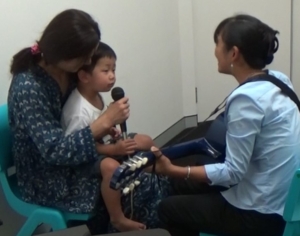5 Musical Tips to Encourage Early Language Development
Hi everyone! I’m Iani Sujono, your Registered Music Therapist from Sound Expression in Sydney Australia. Here are my 5 tips on how you can use music to encourage your young child’s vocal exploration and language development.
Tip 1. Using music to connect
Even if your child isn’t yet able to use words, it’s ok – just have fun using your voices together, use lots of facial expressions as you connect.
The purpose of this exercise: Rewarding engagement. Release frustrations and see the joy as the musical conversation makes your child feel more at ease about using their voice to connect with you.
Tip 2. Making it fun and rewarding
Use different sounds, be animated, use gestures, introduce them to loud and soft, fast and slow. You don’t need instruments to create your own orchestra – every home has pots and pans, toys and surfaces that can be tapped, played or shaken. Try various vocal patterns and rhythmic patterns and encourage your child to imitate the pattern; get them to make a vocal or rhythmic pattern and you imitate them.
The purpose of this exercise: Showing your child that conversations and expression can happen anywhere, at anytime, with anyone. Imitating patterns encourages them to initiate engagement.
Tip 3. Physical connection is vital
Connect your child to the music by tapping the beat as you sing with them or bounce them on your lap.
The purpose of this exercise: This creates broader sensory input and greater potential for response.
Tip 4. Use a microphone
Hearing their voice being amplified can help build confidence. It gives your child that sense of “Here I am, this is my voice and my voice matters!”. Another great thing about a microphone is the clarity it gives to the structure of a conversation “My turn to sing, your turn to sing”; “My turn to speak, your turn to speak”. Do be careful though, not every child loves their voice being amplified and may feel anxious about using their voice.
The purpose of this exercise: Building confidence and turn taking.
Tip 5. Singing a conversation
When your child is ready, encourage them to make a sound at specific moments in the music. Choose a familiar song that your child knows and loves. One that is repetitive is easier to learn. The key in this exercise is to create an unfinished melody. Why? Because an incomplete musical phrase begs for a response. I might sing “Five little ducks went out one….”. At this stage of development, I don’t focus too much on whether the child sings the right word – “day”. I simply want the child to vocalise purposefully at specific moments in the music, creating a little bit of structure in the conversation.
The purpose of this exercise: It encourages a more purposeful and structured vocal engagement. Children with autism often appreciate the use of familiar songs because the predictability helps make them feel safe.
So, those are my 5 Tips on encouraging language development at the very early stages of vocal exploration. For more ideas, follow us on Facebook or YouTube, or go to our website soundexpression.com.au
Till next time, enjoy your music!





